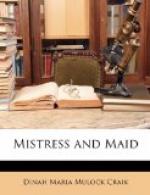“There, Miss Halary, I flatter myself that’s not a bad signature, nor would be easily forged. One can not be too careful over— What’s that? a letter, John?”
By his extreme eagerness, almost snatching it from his footman’s hands, it was one of importance. He made some sort of rough apology, drew the writing materials to him, wrote one or two business-looking letters, and made out one or two more checks.
“Here’s yours Ascott; take it, and let me have done with it,” said he, throwing it across the table folded up. “Can’t waste time on such small transactions. Ma’am, excuse me, but five thousand pounds depends on my getting these letters written and sent off within a quarter of an hour.”
Hilary bent her head, and sat watching the pen scratch, and the clock tick on the mantle-piece; thinking if this really was to be the last of his godfather’s allowance, what on earth would become of Ascott? For Ascott himself, he said not a word. Not even when, the letters dispatched, Mr. Ascott rose, and administering a short, sharp homily, tacitly dismissed his visitors: Whether this silence was sullenness, cowardice, or shame, Hilary could not guess.
She quitted the house with a sense of grinding humiliation almost intolerable. But still the worst was over; the money had been begged and given—there was no fear of a prison. And spite of every thing, Hilary felt a certain relief that this was the last time Ascott would be indebted to his godfather. Perhaps this total cessation of extraneous help might force the young man upon his own resources, compel his easy temperament into active energy, and bring out in him those dormant qualities that his aunts still fondly hoped existed in him.
“Don’t be down-hearted, Ascott,” she said: “we will manage to get on somehow till you bear of a practice, and then you must work—work like a ‘brick,’ as you call it. You will, I know.”
He answered nothing.
“I won’t let you give in, my boy,” she went on, kindly. “Who would ever dream of giving in at your age, with health and strength, a good education, and no encumbrances whatever—not even aunts! for we will not stand in your way, be sure of that. If you can not settle here, you shall try to get out abroad, as you have sometimes wished, as an army surgeon or a ship’s doctor; you say these appointments are easy enough to be had. Why not try? Any thing; we will consent to any thing, if only we can see your life busy and useful and happy.”
Thus she talked, feeling far more tenderly to him in his forlorn despondency than when they had quitted the house two hours before. But Ascott took not the slightest notice. A strange fit of sullenness or depression seemed to have come over him, which, when they reached home and met Aunt Johanna’s silently-questioning face, changed into devil-may-care indifference.
“Oh yes, aunt, we’ve done it; we’ve got the money, and now I may go to the dogs as soon as I like.”




